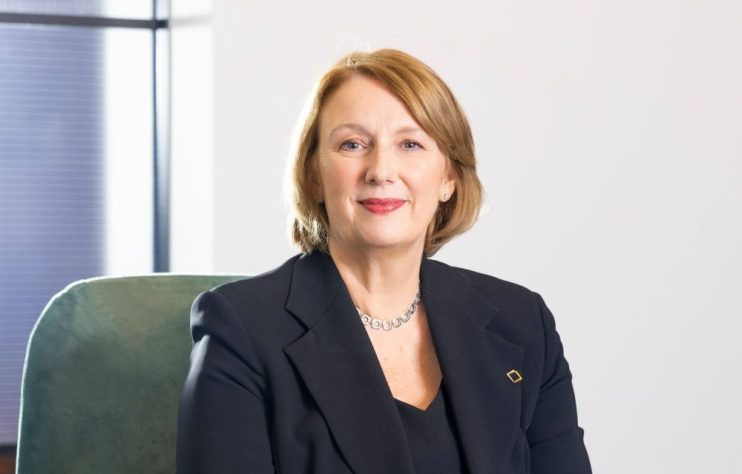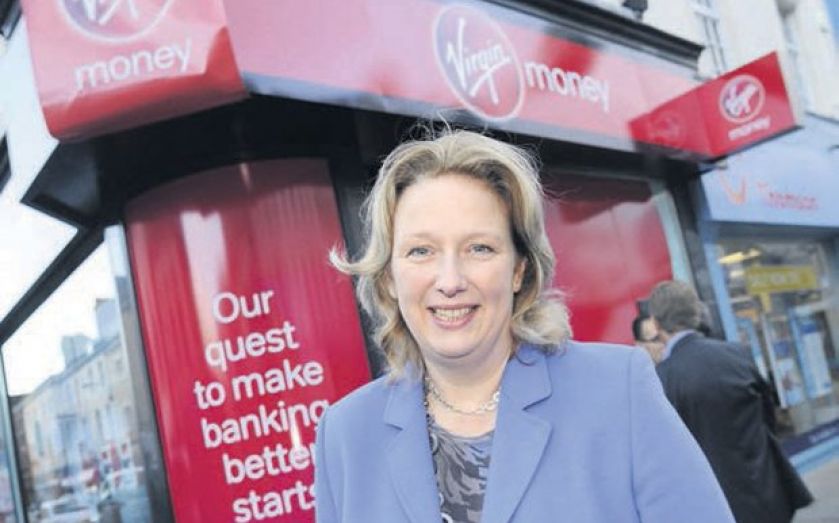Dame Jayne-Anne Gadhia: Menopause, Richard Branson and carving out a path for women’s success in the City

Just before the pandemic, a group of the country’s top executives clambered aboard a coach at a Manchester hotel bound for the hallowed turf of Old Trafford. Their destination was not a United game but a corporate leadership shindig , where stars from club’s heyday – the likes of Peter Schmeichel and Alex Ferguson – would address bosses on how to motivate, how to manage, and how to succeed.
Just like the booze-fuelled coaches heading to United’s HQ on a gameday, it was a male affair. But among the chiefs on board was Dame Jayne-Anne Gadhia, the former boss of Virgin Money and the mastermind of the government’s 2016 review on female representation in the City.
She was among the last to board the bus and took a seat next to one of the attendees – a “famous male CEO”.
“Just as I sat down, he said ‘Before you even start, I haven’t signed up to your Women in Finance Charter’,” Gadhia tells City A.M. in an interview.
“Why?”, she asked.
“Well to be honest, there’s not enough good women,” came the response.
For Gadhia, the comments shone a light on a view still pervasive at the top of British PLC – a world where quiet resistance to change and a one-size-fits-all view of City culture still hold strong.
Her review of gender diversity in financial services cast a damning picture of the gender make up of the sector. The report found women made up just 14 per cent of executive committees in financial services while a “permafrost” in middle management had frozen out women from the top jobs.
Into the boardroom
Gadhia’s own rise might seem to counter that view, but her journey to the pinnacle of British business came outside of and in spite of the staid British boardroom rather than because of its willingness to embrace her.
Following a history degree at Royal Holloway, she jokes she and her Indian husband eloped to become accountants after bucking his family’s plans for an arranged marriage. That led to a stint at Ernst Whinney, the precursor to EY, before joining Aviva’s predecessor Norwich Union. But it was a chance meeting that kickstarted her rise up the ladder.
“I met someone that worked at Virgin, and I had just been reading about Richard Branson and the way in which he did business differently, and I said “I’d love to be part of it”.”
Branson was at the time looking at how to expand the Virgin brand beyond records and planes and into the broader business world. Gadhia offered the traditional financial nous along with a desire to ruffle some feathers.
Winning round regulators to the idea of a Virgin financial services brand was not a straightforward task, however. One senior watchdog asked the pair “how on earth” a record and aeroplane company was going to run a bank.
“Richard said, ‘well nobody would get on my aeroplanes if they thought they wouldn’t get off the other end’,” she laughs.

Gadhia went on to launch Virgin Direct with Branson before leaving the firm and returning on the eve of the financial crisis, leading it through the downturn, through the £747m acquisition of Northern Rock in 2011 and onto a £2bn float in 2014.
The days of Virgin Money floating in London might seem like a halcyon era, but even now as the founder of fintech firm Snoop and chair of wealth management app Moneyfarm, Gadhia says the City would still be her destination of choice for an IPO.
“The one thing that you can always be absolutely certain of in London is the rule of law,” she says. “So I’d be thinking very hard before listing anywhere else other than London if I’m honest, because of all of that history.”
Ruffling feathers
The City’s history and structure is not something she typically champions, however. Gadhia’s mission in the latter half of the 2010s turned to ripping up the status structures that have held the Square Mile together for decades and carving out a route for women to succeed.
After kicking off her deepdive in 2015, she says the clear and obvious obstacle to gender parity was the ruthless machismo ingrained in and rewarded at the UK’s top financial firms. The central question of her review was why half of senior jobs in financial services were not taken by women, and the answer, she says, was “very much around the culture”.
“Men would go to their boss bang the table and say ‘I’ve had a really good year, I want a good bonus’, whereas women would not want to bang the table, and they would expect to be recognised,” she says.
But because of “weak managers”, those that were banging the table were seeing the results. That, she says, has started to change.
The average female representation has increased to 35 per cent in financial services last year, according to the government’s latest Women in Finance charter update. Some 77 per cent of signatories had either increased or maintained their proportion of women in senior management ater a pandemic plateau.
However, while target numbers are “important” and being hit, she says there is still a uniform view of City culture holding back real diversity beneath the surface.
“We’re still in a place where some leaders […] who run large organisations might say, ‘things have really changed now […] 50 per cent of my board are women and we’ve got ethnic diversity as well. I love them all and they’re all doing great. All I ask is that they behave like me.’
“For me, that’s the big problem,” she adds.
“The reason that we want diversity is to change some of those behaviours we’ve been concerned about over the years. What we don’t want is a diverse group of people all behaving like a traditional white Anglo Saxon man.”
The uniformity in outlook has fed into a lack of understanding of female experience and an unwillingness to confront some of the more physical challenges facing women in the workplace, she says.
She has been a vocal champion for better understanding of the challenges facing menopausal women and says, frankly, it is a topic that has presented some tricky obstacles as her career has progressed.
“It’s not just the hormonal challenges that are a problem. Forgive me if I’m embarrassing you with this, but part of the problem with the menopause turns out not to be it involves an awful lot of blood,” she says.
“You end up in meetings worrying about what happens when you stand up. Or if you were me, I happened to be on Richard Branson’s private jet which had a white carpet in the toilet. When I got off it wasn’t white anymore.”
Empathy is the antidote here, she argues: fostering workplaces where topics like those can be brought out into the open and discussed openly.
The levers that can be pulled to achieve it are still complex and varied, and sadly, she says, much of the heavy lifting needs to be done by men corralling their peers into action.

Top down change
At the Old Trafford leadership seminar, a male American general discussed the importance of diversity, the boss of UPS talked about gender diversity being key to the firm’s success, and Alex Ferguson spoke about how important diversity was in teams and in creating great results.
When she boarded the coach again at the end of the day, the same executive approached Gadhia and said he would sign up to her charter.
“What had changed? Male peers who he respected felt this was the right way to go,” Ghadia says.
“The moral of that story for me – and I don’t belittle it or decry it at all – is that real change is going to come by people that hold power now changing and being able to see they’re going to be more successful by being more inclusive.”